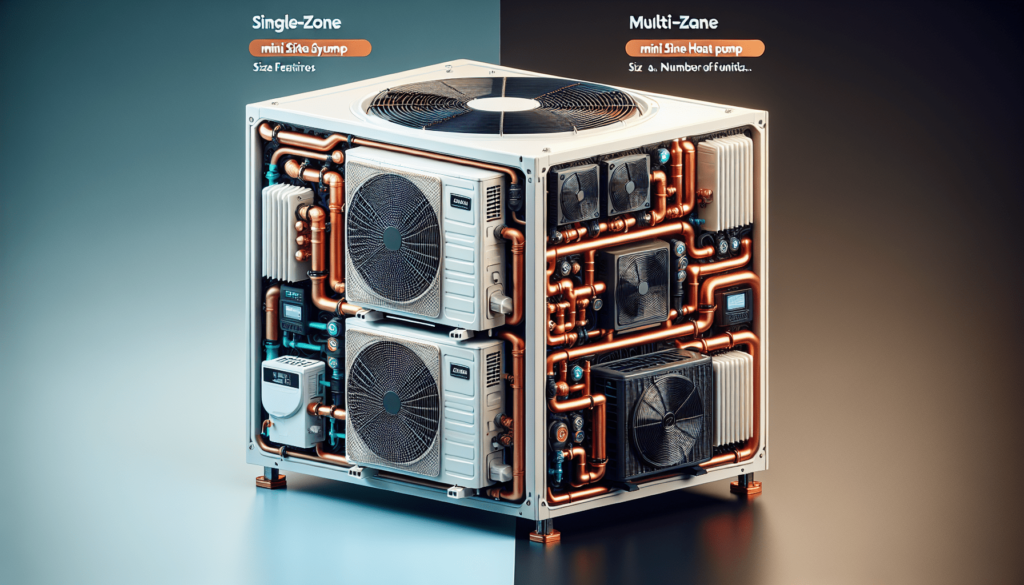Welcome to an informative article that delves into the world of single zone vs. multi-zone mini split heat pumps. In this article, we will explore the differences between these two types of heat pumps and help you determine which option may be best for your heating and cooling needs. Whether you are looking to heat or cool a single room or multiple rooms in your home, this comparison will guide you in making an informed decision. So sit back, relax, and let’s learn more about single zone vs. multi-zone mini split heat pumps!
Comparing Single Zone Vs. Multi-Zone Mini Split Heat Pumps
Hey there! If you’re in the market for a new HVAC system for your home, you may be considering a mini-split heat pump. But do you go with a single zone or a multi-zone system? Let’s break down the differences between the two to help you make an informed decision.
Single Zone Mini Split Heat Pumps
Single zone mini split heat pumps are designed to heat or cool a single room or area of your home. It consists of one outdoor condenser unit connected to one indoor wall-mounted unit. This type of system is perfect for smaller spaces like bedrooms, home offices, or basements.
With a single zone mini split heat pump, you have the flexibility to control the temperature of that specific room, allowing for personalized comfort. These systems are typically more affordable than multi-zone systems, making them a cost-effective option for homeowners looking to add supplemental heating or cooling to a specific area.
Multi-Zone Mini Split Heat Pumps
On the other hand, multi-zone mini split heat pumps are designed to heat or cool multiple rooms or areas of your home. These systems consist of one outdoor condenser unit connected to multiple indoor wall-mounted units throughout the house. This type of system is perfect for larger homes or spaces where individual temperature control is desired in multiple areas.
With a multi-zone mini split heat pump, you have the flexibility to set different temperatures in each room or area of your home, providing customized comfort for everyone in the house. While multi-zone systems may be more expensive upfront due to the additional indoor units, they offer greater flexibility and efficiency in the long run.

Energy Efficiency
When it comes to energy efficiency, both single zone and multi-zone mini split heat pumps are highly efficient compared to traditional HVAC systems. These systems use inverter technology to adjust the speed of the compressor based on the heating or cooling needs of the space, resulting in lower energy consumption and reduced utility bills.
However, in terms of energy efficiency, single zone mini split heat pumps may have a slight edge over multi-zone systems. With single zone systems, you have the ability to only heat or cool the rooms that are in use, minimizing energy waste in unoccupied spaces. Multi-zone systems, on the other hand, require multiple indoor units running simultaneously, which may lead to higher energy consumption.
Installation and Maintenance
When it comes to installation and maintenance, both single zone and multi-zone mini split heat pumps require professional installation by a qualified HVAC technician. The installation process involves mounting the indoor and outdoor units, running refrigerant lines, and connecting electrical wiring.
In terms of maintenance, both types of systems require regular cleaning of filters, coils, and drainage lines to ensure optimal performance. It’s important to schedule annual maintenance checks with a professional to keep your mini split heat pump running smoothly.

Cost Comparison
Let’s talk about the cost comparison between single zone and multi-zone mini split heat pumps. Single zone systems are generally more affordable upfront compared to multi-zone systems due to the lower number of indoor units needed. If you’re on a budget or looking to heat or cool a specific room, a single zone mini split heat pump may be the best option for you.
On the other hand, multi-zone systems may be more expensive upfront due to the additional indoor units required for each room or area. However, if you’re looking to heat or cool multiple rooms in your home with individual temperature control, a multi-zone mini split heat pump may be the more cost-effective option in the long run.
Noise Level
One key factor to consider when choosing between a single zone and multi-zone mini split heat pump is the noise level. Single zone systems are generally quieter than multi-zone systems since they have fewer indoor units running simultaneously. If you’re sensitive to noise or looking for a quiet heating and cooling solution, a single zone mini split heat pump may be the better choice for you.
Aesthetics
Another factor to consider is the aesthetics of your home. Single zone mini split heat pumps have one indoor unit that is typically mounted high on the wall, which may be more visually appealing to some homeowners. On the other hand, multi-zone systems have multiple indoor units mounted throughout the house, which may be less aesthetically pleasing to some.
Conclusion
In conclusion, when choosing between a single zone and multi-zone mini split heat pump, consider factors such as the size of your home, energy efficiency, installation and maintenance requirements, cost, noise level, and aesthetics. Both types of systems offer unique benefits and features, so it’s important to weigh the pros and cons to determine which option is the best fit for your needs.
I hope this article has helped you understand the differences between single zone and multi-zone mini split heat pumps. If you have any more questions or need further assistance, don’t hesitate to reach out. Remember, your comfort and satisfaction are our top priorities!

